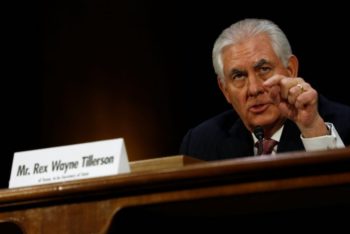
China said it had the right to act in its own territory in the disputed South China Sea, pushing back after President-elect Donald Trump’s nominee for secretary of state said Beijing must be denied access to reclaimed reefs.
While China’s foreign ministry issued a relatively measured response to the remarks, the threat from former Exxon Mobil Corp. chief Rex Tillerson raises the prospect of a more antagonistic U.S. approach to Beijing’s military buildup in the area. In recent years China has reclaimed thousands of acres of land and shooed away boats from other claimant states like the Philippines and Vietnam.
Hours into a confirmation hearing with the Senate Foreign Relations Committee, Tillerson compared China’s actions to those of Russia in Crimea, saying a failure to respond had allowed it to “keep pushing the envelope” in the South China Sea. “We’re going to have to send China a clear signal that first the island-building stops and second your access to those islands is also not going to be allowed.”
China has been acting within the limits of its sovereignty, Foreign Ministry spokesman Lu Kang said in response. “Like the U.S., China has the right within its own territory to carry out normal activities,” he said at a regular briefing in Beijing.
The remark is the latest from Trump’s administration to signal a more aggressive defense posture against China in addition to calls for a tougher line on trade. Trump earlier questioned the U.S.’s policy of recognizing Beijing over the government in Taiwan, and criticized China for a perceived failure to pressure North Korea more over its nuclear program.
Still, Lu said on Thursday that China agreed with Tillerson on areas of cooperation between the two countries. On Monday, Alibaba Group Holding Ltd. Chairman Jack Ma met with Trump and discussed plans to create 1 million new jobs in the U.S. by helping small businesses sell goods to China.
Tillerson offered no detail about how the U.S. could stop China from reclaiming more land, or prevent access. In recent years the U.S. navy has conducted semi-regular freedom of navigation operations throughout the area, but that has not deterred China.
‘Fuel on the Fire’
“This is the sort of off-the-cuff remark akin to a tweet that pours fuel on the fire and maybe makes things worse,” said Malcolm Davis, a senior analyst at the Australian Strategic Policy Institute in Canberra. “Short of going to war with China, there is nothing the Americans can do.”
China claims more than 80 percent of the South China Sea, where it has constructed features on seven rocks and reefs and installed military facilities. Several Southeast Asian nations and Taiwan also claim parts of the area, through which more than $5 trillion of trade passes each year.
In March, Trump accused Beijing of building a military fortress. “They do that at will because they have no respect for our president and they have no respect for our country,” he said.
Tillerson also said he would stand by U.S. defense treaties with Japan and South Korea. These had been in doubt after Trump said in an interview last March that he would consider withdrawing U.S. troops if allies didn’t pay more for their upkeep. Asked whether he agreed with Trump’s assertion that it wouldn’t be a bad thing for the U.S. if Japan and South Korea acquired nuclear weapons, Tillerson said he “did not agree.”
The nominee also appeared to suggest he would maintain a U.S. pledge to defend Japan-administered islands close to Taiwan against any military take-over by China, which also claims them. Japanese and Chinese ships and planes have tailed one another around the uninhabited islands known as Senkaku in Japan and Diaoyu in China.
“We have long-standing ally commitments with Japan and South Korea in the area and I think we would respond in accordance with those accords,” he said. “Certainly we have made commitments to Japan in terms of a guarantee of their defense.”
Japanese Chief Cabinet Secretary Yoshihide Suga declined to comment on Tillerson’s remarks.
Source: Bloomberg L.P
